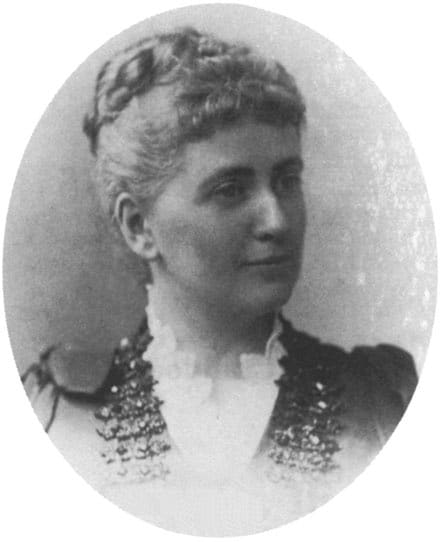The 1873 Comstock law criminalized the mailing of contraceptives and contraceptive information, and was passed by a young Civil War veteran, Anthony Comstock. Over the course of more than 40 years, he charged 4,000 people, including Margaret Sanger and Emma Goldman, under the law. For nearly nine years he pursued a self-taught sexologist, Ida C. Craddock, who went by “Mrs.” and claimed she had learned about sex from a ghost husband. She wrote and mailed sex advice manuals including Helps to Happy Wedlock, Advice to a Bridegroom, and Letter to a Prospective Bride, and taught courses on “scientific motherhood,” or birth control.
Born in 1857, Craddock was a brilliant, Quaker-educated Philadelphian. She was denied entry to the University of Pennsylvania because she was a woman and became a self-taught scholar of world religions. After a trip to watch the belly-dancers at the 1893 World’s Fair, she wrote an essay for the New York World that praised the dances. She reproduced it as a pamphlet and sold it by mail. In it she advocated a technique called coitus reservatus, where the man orgasms without ejaculating.
Craddock was arrested by postal authorities for mailing sex books
In her books she recommended that men avoid ejaculation during intercourse except for procreation, and she advocated naked sex and foreplay (or “love-making) for 15 to 30 minutes. In Philadelphia she was arrested but let go with a warning.
Moving to Chicago in 1899, she reinvented herself as “Pastor of the Church of Yoga” and taught sex courses based on oneness with the universe. Postal authorities had her arrested and seized her books. She retained lawyer Clarence Darrow, who would later become a well-known free speech attorney. But he encouraged her to take a plea. The judge gave her a suspended sentence and all her books were burned.
'The Wedding Night' was Craddock's most controversial work
In spring 1901 she moved to Washington, D.C., and wrote her most controversial pamphlet, The Wedding Night, which used the word semen and gave instructions for entering a virgin bride without causing pain. She also critiqued Comstock in strong sexual language. A judge declared it obscene but agreed to let her off if she left D.C.
She soon found herself in New York City, Comstock’s home base. Though employed by the Post Office, he was also the secretary of the private New York Society for the Suppression of Vice (NYSSV). When Craddock’s landlord, a lay Baptist preacher, found out that she was giving sexual advice in his building, he tried to evict her. She protested and he said that if Comstock would endorse her books, she could stay.
She sent Comstock her books to ask if they were legal. Citing her Chicago case, he said they violated state and federal statutes. Using the pseudonym Frank Lea, he promptly wrote her to buy The Wedding Night. Comstock decoyed dozens of victims, often mailing letters across state lines to build federal cases.
Anthony Comstock arrested Craddock for mailing sex-advice books
Comstock accompanied two deputy marshals to her apartment to arrest her, rifled through her books and whistled the “Hoochy Koochy,” the belly-dancing theme song. She was charged in federal and state court for mailing and hand-selling her books. Free speech advocates, or “freethinkers,” were outraged by her arrest. Contributions for her legal fees came in from as far away as Canada.
During her state trial, the justices conflated obscenity and blasphemy. An Irish Catholic judge characterized The Wedding Night as “the most blasphemous book I ever saw,” and sentenced her to three months in the Women’s Workhouse on Blackwell’s Island. She survived harrowing conditions. Following her release, the Free Speech League, an ACLU forerunner, raised money for her.
Her federal trial began in October 1902. The indictment cited three “obscene” passages in The Wedding Night: entering a virgin bride, the critique of “Comstockism,” and advice on pelvic movements during sex. The jury found her guilty without leaving their seats.
The morning of her sentencing she was found dead in her flat, having poisoned herself with illuminating gas. She was 45. Her death was reported with headlines like “Priestess of Yoga a Suicide.” The night before her suicide, she wrote a letter to the public calling Comstock “a sex pervert” who had invaded her “right to freedom of religion and to freedom of the press.”
Emma Goldman, a later birth control activist, called Craddock “one of the bravest champions of women’s emancipation.”
Amy Sohn is the award-winning author of The Man Who Hated Women: Sex, Censorship, & Civil Liberties in the Gilded Age.

